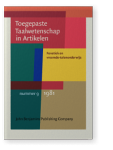J.J. Spa
List of John Benjamins publications for which J.J. Spa plays a role.
Articles
1991 //ese//, Suffixe du Francais Contemporain Lingvisticæ Investigationes 15:2, pp. 337–346 | Article
In this article it will be argued that in contemporary French an underlying suffix //ese// has to be admitted in order to account for the surface (lexical) representations /-ess/ and /-so/ (cf. /delikatese/ delicatesse "delicacy" and /obeisase/ obeissance "obedience"). Several arguments will be… read more
1989 [e, e, e]: La Solution Paracyclique Lingvisticæ Investigationes 13:1, pp. 147–178 | Article
The article presents a critical review of the various solutions that have been proposed, within the framework of generative phonology, regarding the problem of the morphophonological relations between the sounds [e, e, e] in French. In order to remedy the flaws in the above mentioned approaches… read more
1987 Réponse: La Logique Des Restrictions Phonotactiques: Une Tautologie? Lingvisticæ Investigationes 11:2, pp. 409–410 | Discussion
1987 Les Deux Schèmes Syllabiques du Français Lingvisticæ Investigationes 11:1, pp. 197–223 | Discussion
In the present paper is proposed a theory of the French syllable within the framework of non-linear phonology. The theory claims to be a novel one in that it stresses the need for a distinction between two types of syllable templates, one for full vowels and one for shwa. Some evidence will be… read more
1985 Réflexions Sur Les Restrictions Phonotactiques Lingvisticæ Investigationes 9:2, pp. 377–390 | Article
Grosso modo les phonologues ont proposé trois manières pour traiter des données phonotactiques: 1. L'approche des conventions marquantes, 2. L'approche qui affirme positivement l'occurrence de tel ou tel groupe consonantique dans telle ou telle position, 3. L'approche qui exclut l'occurrence de tel… read more
1984 Le [e] Est Mort. Vive Le /e/! Lingvisticæ Investigationes 8:1, pp. 151–159 | Article
Dans les dictionnaires de français on rencontre fréquemment, parmi les signes de transcription phonétique, le symbole [e] pour indiquer la consonne nasale palatale. Dans plus d'un manuel de phonétique on signale cependant que les prononciations [e] et [nj] se confondent, surtout dans la langue… read more
1981 Desonorisatie, Denasalisatie, Veranderingen In Klinkertimbre En Klin-Kerhoogte In Door Nederlanders Gesproken Frans. Fonetiek en vreemde-talenonderwijs, pp. 20–43 | Article
Il s'agit d'une recherche réalisée au département de français de l'Université d'Amsterdam. Nous avons enregistré la "performance" d'étudiants de 1ère année qui n'avaient pas encore été exposés à un contact durable avec la langue française. Nous avons distingué cinq niveaux de production, du plus… read more






